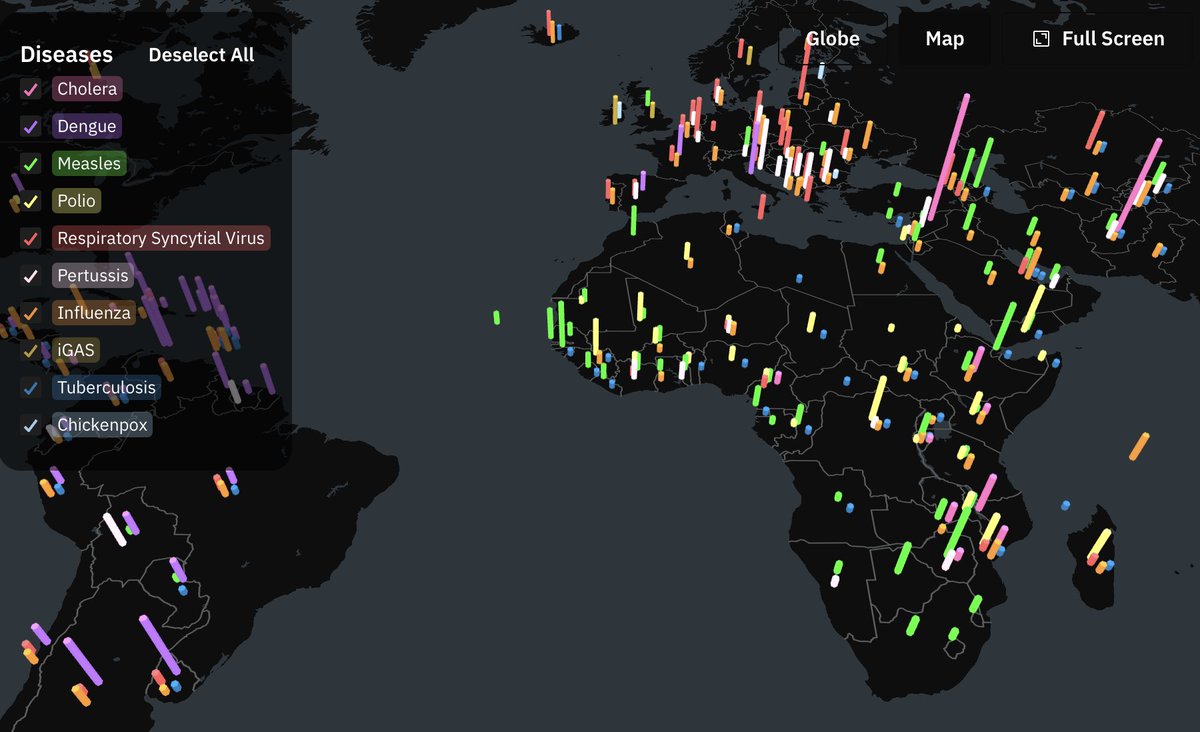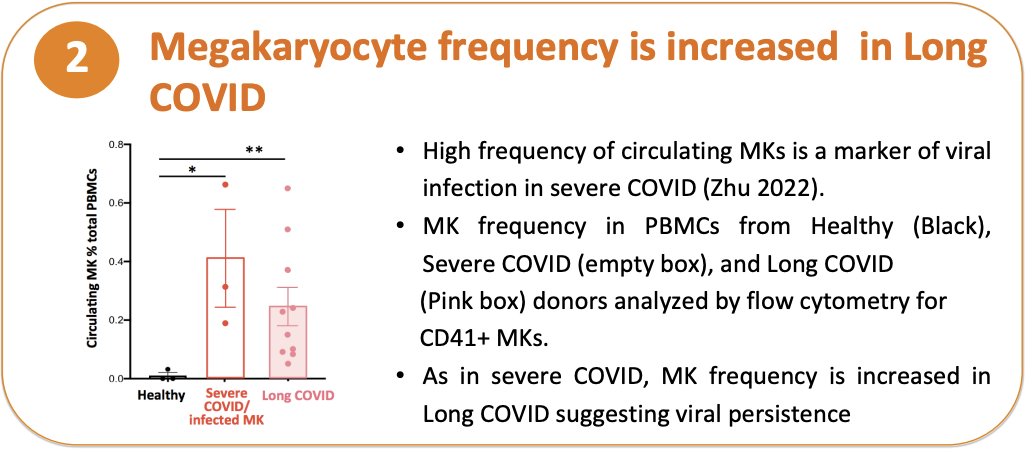How does being vaccinated impact the risk of #LongCovid?
A thread on 8 studies (I'll add to it as I find more):
1/
A thread on 8 studies (I'll add to it as I find more):
1/
The summary: vaccination definitely seems to reduce the risk of #LongCovid, often by 40-50%.
*But* solidly 9.5%-14% of breakthroughs still result in Long Covid.
These figures make sense to me, given the estimated rate of LC in unvaccinated people (~10-30%).
2/
*But* solidly 9.5%-14% of breakthroughs still result in Long Covid.
These figures make sense to me, given the estimated rate of LC in unvaccinated people (~10-30%).
2/
A caveat: many of these studied people who had been vaccinated relatively recently, so as always, we can expect these findings to change a bit as immunity wanes.
3/
3/
Study 1: this is one of two studies rated as high quality by UKHSA.
10,024 breakthrough cases with matched controls, looking 6 months from onset, found vaccination:
medrxiv.org/content/10.110…
4/
10,024 breakthrough cases with matched controls, looking 6 months from onset, found vaccination:
medrxiv.org/content/10.110…
4/
-did not reduce overall #LongCovid risk, but did reduce risk of some key symptoms: fatigue, anosmia, hair loss, lung disease, myalgia
-did not reduce risk for other symptoms: abdominal pain, headache
-did reduce severe outcomes (hospitalization, death, respiratory failure)
5/
-did not reduce risk for other symptoms: abdominal pain, headache
-did reduce severe outcomes (hospitalization, death, respiratory failure)
5/
Study 2: also rated high quality, this found a 7-10x reduced rate of #LongCovid!
Why the difference between Study 1? Not clear, but the number of breakthroughs was smaller (2400) here; it was also pre-Delta, where Study 1 included some Delta cases.
medrxiv.org/content/10.110…
6/
Why the difference between Study 1? Not clear, but the number of breakthroughs was smaller (2400) here; it was also pre-Delta, where Study 1 included some Delta cases.
medrxiv.org/content/10.110…
6/
Study 3:
3090 breakthroughs with controls (too new to be rated, but seems high quality) found a 41% decrease in #LongCovid risk.
However, #LongCovid still happened in 9.5% of vaccinated participants compared to 14.6% of unvaccinated. Still high!
medrxiv.org/content/10.110…
7/
3090 breakthroughs with controls (too new to be rated, but seems high quality) found a 41% decrease in #LongCovid risk.
However, #LongCovid still happened in 9.5% of vaccinated participants compared to 14.6% of unvaccinated. Still high!
medrxiv.org/content/10.110…
7/
Study 4: 16035 breakthroughs & 3.57 million controls. Found vaccination had specific impacts:
-Reduced risk in cardiovascular, coagulation, metabolic, pulmonary organ systems, & fatigue
-Not reduced in kidney, gastrointestinal, neurologic systems
researchsquare.com/article/rs-106…
8/
-Reduced risk in cardiovascular, coagulation, metabolic, pulmonary organ systems, & fatigue
-Not reduced in kidney, gastrointestinal, neurologic systems
researchsquare.com/article/rs-106…
8/
Study 5:
366 breakthroughs and unvaccinated controls found 26.5% of fully vaccinated and 34.9% of unvaccinated had #LongCovid.
After further analysis, they suggested that vaccination reduced the risk of Long Covid by 45%.
medrxiv.org/content/10.110…
9/
366 breakthroughs and unvaccinated controls found 26.5% of fully vaccinated and 34.9% of unvaccinated had #LongCovid.
After further analysis, they suggested that vaccination reduced the risk of Long Covid by 45%.
medrxiv.org/content/10.110…
9/
Study 6:
App-based study, 2370 breakthroughs with matched controls found that *full* vaccination reduced #LongCovid symptoms by roughly half. Notably, one dose resulted in the same Long Covid prevalence as unvaccinated controls.
thelancet.com/journals/lanin…
10/
App-based study, 2370 breakthroughs with matched controls found that *full* vaccination reduced #LongCovid symptoms by roughly half. Notably, one dose resulted in the same Long Covid prevalence as unvaccinated controls.
thelancet.com/journals/lanin…
10/
The next 2 are weird or less comprehensive for different reasons.
11/
11/
Study 7:
This one included a) uninfected controls & b) unvaccinated infected controls, along with vaccinated infected. Some false negatives or sick people were likely in the uninfected controls, because they had high baseline symptom rates (recruited from PCR test sites).
12/
This one included a) uninfected controls & b) unvaccinated infected controls, along with vaccinated infected. Some false negatives or sick people were likely in the uninfected controls, because they had high baseline symptom rates (recruited from PCR test sites).
12/
Comparing unvaccinated to vaccinated, this study found some reductions in some symptoms, but not consistently across age groups.
-No reduction in loss of concentration, persistent cough, overall recovery
13/
-No reduction in loss of concentration, persistent cough, overall recovery
13/
-Did reduce fatigue, headache, weakness, myalgia, hair loss, dizziness & shortness of breath
-Most reductions higher in people >60 than age 19-35
-11% of vaccinated had fatigue vs 26% unvaccinated
-14% of vaccinated had headache vs 22% unvaccinated
medrxiv.org/content/10.110…
14/
-Most reductions higher in people >60 than age 19-35
-11% of vaccinated had fatigue vs 26% unvaccinated
-14% of vaccinated had headache vs 22% unvaccinated
medrxiv.org/content/10.110…
14/
Study 8: this one *only* looked at the effect of vaccination on olfactory dysfunction.
They found vaccination was protective against olfactory dysfunction between 14-88 days after the final dose, but began to wane after that. #LongCovid
medrxiv.org/content/10.110…
15/
They found vaccination was protective against olfactory dysfunction between 14-88 days after the final dose, but began to wane after that. #LongCovid
medrxiv.org/content/10.110…
15/
In summary: get vaccinated to reduce your risk of #LongCovid, but be aware that if you get a breakthrough, the risk is still high!
16/
16/
These findings might also suggest reductions in certain types of #LongCovid (respiratory and possibly cardiovascular stick out to me) but not to others (neurologic and gastrointestinal in particular).
17/
17/
• • •
Missing some Tweet in this thread? You can try to
force a refresh










